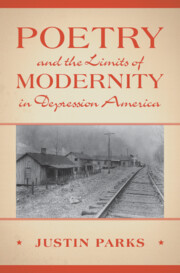Book contents
- Poetry and the Limits of Modernity in Depression America
- Cambridge Studies in American Literature and Culture
- Poetry and the Limits of Modernity in Depression America
- Copyright page
- Dedication
- Contents
- Illustrations
- Acknowledgments
- Introduction
- Part I Historical Materialism and the Materials of History
- Chapter 1 Thinking with Things
- Chapter 2 New Ways of Seeing
- Chapter 3 Pieces of the Body Torn out by the Roots
- Part II Ethnographic Modernity and Its Discontents
- Notes
- Works Cited
- Index
- Recent Books in this Series (continued from page ii)
Chapter 3 - Pieces of the Body Torn out by the Roots
Charles Reznikoff’s 1934 Testimony and the Idiom of American Violence
from Part I - Historical Materialism and the Materials of History
Published online by Cambridge University Press: 21 September 2023
- Poetry and the Limits of Modernity in Depression America
- Cambridge Studies in American Literature and Culture
- Poetry and the Limits of Modernity in Depression America
- Copyright page
- Dedication
- Contents
- Illustrations
- Acknowledgments
- Introduction
- Part I Historical Materialism and the Materials of History
- Chapter 1 Thinking with Things
- Chapter 2 New Ways of Seeing
- Chapter 3 Pieces of the Body Torn out by the Roots
- Part II Ethnographic Modernity and Its Discontents
- Notes
- Works Cited
- Index
- Recent Books in this Series (continued from page ii)
Summary
This chapter focuses on Charles Reznikoff’s 1934 version of his long poem Testimony, which consists almost entirely of collaged-together excerpts from nineteenth-century trial transcripts. The chapter proposes that Testimony utilizes these materials to suggest a link between past and present violence and social fragmentation, rejecting narratives of progress associated with the modern American nation and tacitly embracing the “debunking” imperative animating the work of interwar historians such as Caroline Ware. Reznikoff’s text is organized around the spectacle of the body in pain as a galvanizing scene within the modern public sphere, where public affect and social belonging were generated through collective acts of witnessing (and often perpetrating) violence and disaster. The chapter concludes by suggesting that the final subsection of Testimony, titled “Depression,” draws its subject matter from the aftermath of the “Depression” of 1873, as the text proposes this earlier period as a parallel to the crisis of the 1930s. In recalling this earlier period, the chapter claims further, Testimony proposes a negative vision of economic and technological modernity by revealing its human collateral, as well as the cyclical nature of modern social and economic crisis.
Keywords
- Type
- Chapter
- Information
- Poetry and the Limits of Modernity in Depression America , pp. 72 - 92Publisher: Cambridge University PressPrint publication year: 2023



